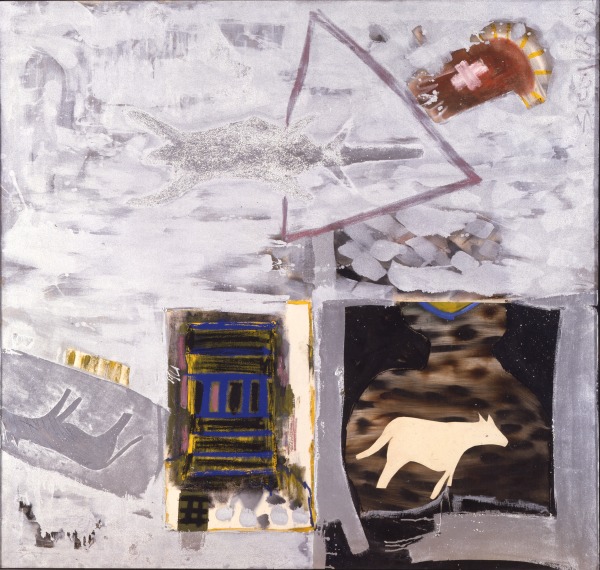ESCALA presents Baño en el cañito (Bathing in the Stream)(2000), a short video by Colombian artist Wilson Diaz.
The video accompanies two photographs currently on display in the Albert Sloman Library and was made when Diaz was invited to visit the Zona de Distensión (Clearance Zone) created for negotiation between the Colombian government and guerrillas of the FARC (Colombian Revolutionary Armed Forces) in San Vicente del Caguán in Caquetá.
The video will be followed by a discussion and questions and answers.
Speakers: Dr Clara Sandóval, Lecturer and Co-Director of LLM International Human Rights Law, Department of Law and Dr Joanne Harwood, Director of ESCALA.
Ofelia Rodríguez was born in Barranquilla on Colombia's Caribbean coast. After training at the Universidad de Los Andes, Colombia and at Yale, Ofelia settled in London where she continues to live and work.
Ofelia enjoys an international reputation and is represented by five works in the Essex Collection of Art from Latin America. In 1999 she exhibited at the University Gallery, Relics and Mementos, and in 2007 had a major retrospective in Bogotá. Accompanied by images, Ofelia will discuss her work and its inspirations from pop art to the popular traditions of Latin America.
Speakers: Ofelia Rodríguez and Dr. Joanne Harwood.
Images: Ofelia Rodríguez, Wordless - with the Virgin of Guadalupe, 1998
Trazos humanos / Human Traces is inspired by the 25th Anniversary of the University of Essex Human Rights Centre which, in 2008, coincides with the 50th Anniversary of the Universal Declaration of Human Rights (UDHR), adopted and proclaimed by the General Assembly of the United Nations on December 10, 1948.
Most of the works in Human Traces are drawn from the Essex Collection of Art from Latin America (ESCALA) and explore the direct and indirect engagement of contemporary Latin American artists with the basic rights and freedoms to which all humans are entitled, as expressed in the UDHR.
The Spanish word trazo (plural, trazos) can mean line, stroke, sketch, outline or feature. The title of this exhibition alludes to the presence or, more often, absence of humans and their rights in the works included; to the 'traces' by which they are represented and, still further, to the vital 'marks' made by artists in order to recapture a sense of humanity in often dehumanising circumstances.
Trazos humanos / Human Traces is a collaboration between the Art Exchange, ESCALA, the Human Rights Centre and the Centre for Latin American and Caribbean Studies, with the support of the University's Annual Fund.
 12 November 2008
12 November 2008
Siron Franco painted Memória in 1990-1992 in protest, after the illegal spillage of the radioactive material Cesium caused widespread death and environmental damage in his former home town in Brazil.
Each week, Spotlight Talks will focus on a different work from the University's Collection of Latin American Art in the Albert Sloman Library.
ESCALA presents a programme of video made by Brazilian artists. Video is flourishing in Brazil and offers unique insights into aspects of the country's uneven development and the diversity of its hybrid culture. Through the eyes of video artists we can access the heterogeneous, and sometimes divergent, art production of the largest Latin American country.
This special event provides an opportunity to see a range of material not readily accessible elsewhere: works by Ana Maria Maiolino, which are part of the Collection, together with recent work by contemporary Brazilian video art makers Lourival Cuquinha, Maria Lucia Cattani, Cezar Migliorin and the collective of artists Gráfica Utópica - O Circo dos Sonhos.
We will also be showing the short film Muro directed by Tião, which was awarded the Short Film Prize 'Un Regard Neuf' (A New Look) at the 2008 Cannes Film Festival.
Curated by Caroline Menezes.
Senise's Três caminhos (1995) shows us a conversation between two silhouetted women. Rather than representing words, Senise gives us a network of lines leaving the viewer to decide what paths the conversation is taking.
Each week, Spotlight Talks will focus on a different work from the University's Collection of Latin American Art in the Albert Sloman Library.
16 June 2008 - 18 June 2008
The Lakeside Theatre's film programme has been brought together to extend the dialogue between arts activities on campus. This Latin American festival is sponsored by the Essex Collection of Art from Latin America and complements the exhibition Trazos humanos / Human Traces at the Art Exchange. Trazos humanos / Human Traces was inspired by the 25th anniversary of the University's Human Rights Centre and the films presented here share a broad human rights focus.
The festival is organised in collaboration with John Cant of the Centre for Theatre Studies, who selected the first two films.
Monday 16 June
Doors: 7.00pm Screening 7.30pm
Admission free
Madama Satã
Karim Ainouz/2002/Brazil-France/105 mins
Portuguese with English subtitles
João Francisco dos Santos (the 'Madama Satã' of the title) was a well known, not to say notorious figure in the Rio de Janeiro of the 1930s and '40s. Flamboyant, violent and talented, he fought his personal battle against the racism and homophobia of his times, frequenting the bars, brothels and prisons of the city and defying prejudice directly by performing as a female impersonator. Loosely based on his life, Madama Satã features a complex narrative, jarring editing, vivid contrasting lighting effects and the passionate music of the Brazilian demi-monde. Ainouz film is deliberately wild, garish, sexy and frenetic, in complete contrast to Verónico Cruz; but both films protest against inhumanity, poverty, cruelty and the denial of fundamental rights and freedoms.
Not suitable for under 18s.
Introduced by John Cant, Centre for Theatre Studies